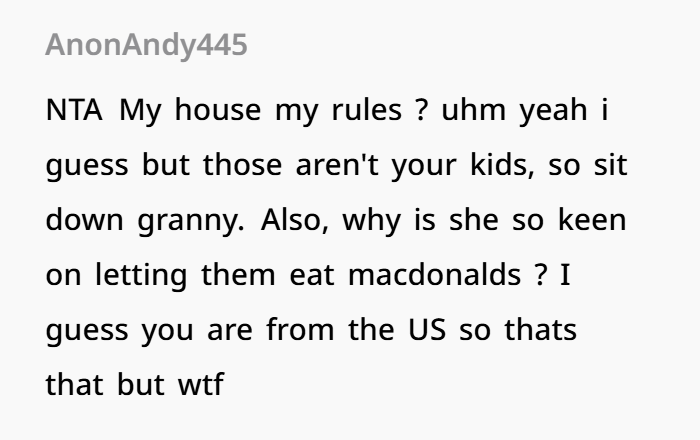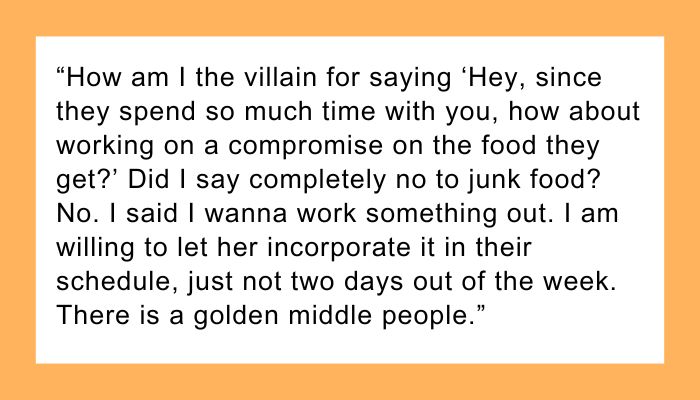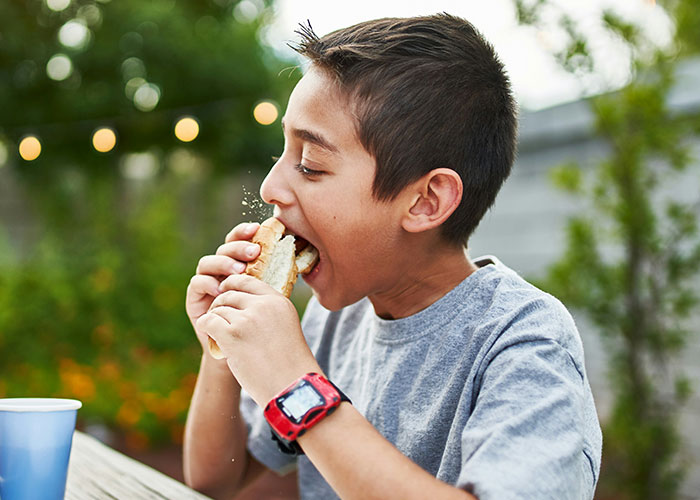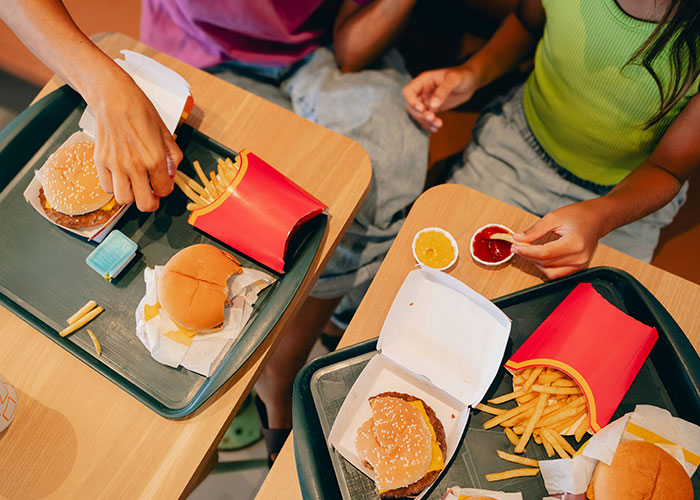Mom Refuses To Leave Kids With MIL After She Keeps Feeding Them Fast Food
Today, more parents are trying to make smart and healthy food choices for their children. That’s because a balanced diet is essential for kids’ growth, brain development, and strong immune systems. But even with the best intentions, it’s not always easy to keep children away from unhealthy snacks and fast food.
In one family’s case, the biggest challenge wasn’t TV ads or school lunches – it was their own grandma. Despite being told not to, she continued giving the kids high-sugar, high-fat junk food. This included items like sugary cereals, soda, chips, and even fast food meals.
The parents kindly asked her to stop, explaining the dangers of feeding kids processed foods and artificial ingredients. But when she ignored their wishes, the situation took a serious turn – and there were real consequences.
They share powerful insights on the risks of fast food for kids, healthy snack alternatives, and how to talk to family members about your child’s nutritional health. This is a must-read for every parent who wants to protect their child from childhood obesity, type 2 diabetes, and other diet-related health problems.
Read for more info Reddit
With so many temptations around, it can be a challenge to maintain healthy children’s diet
For this family, the temptation was the grandma who fed the kids junk food against parents’ wishes and caused quite the drama
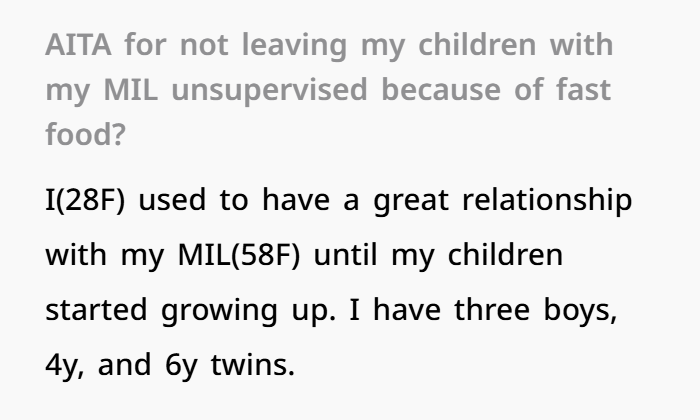

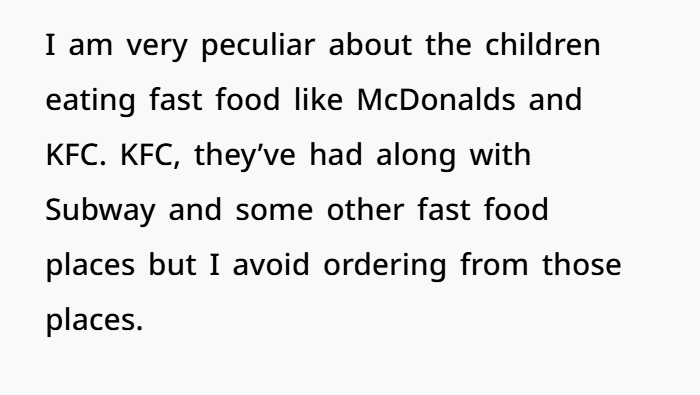
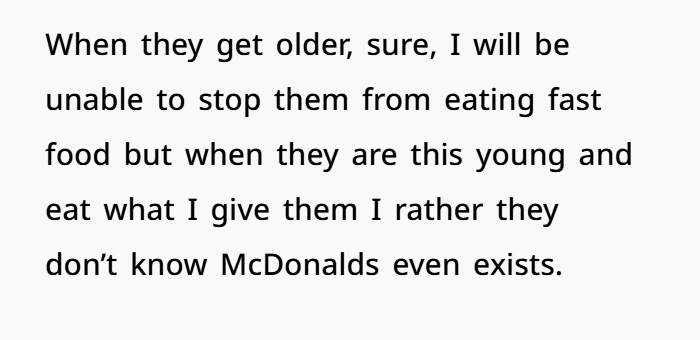




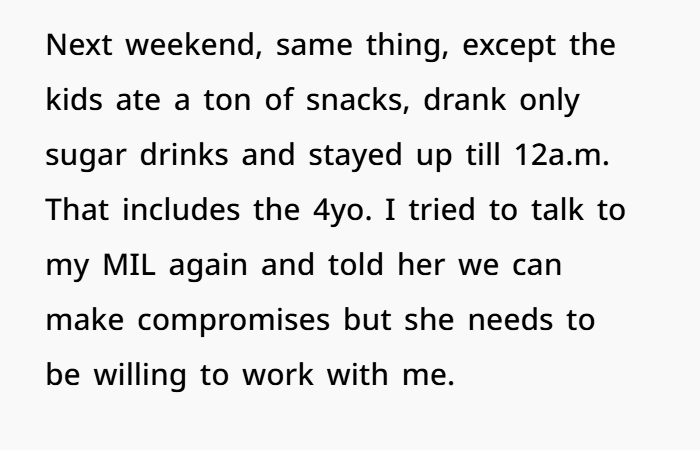







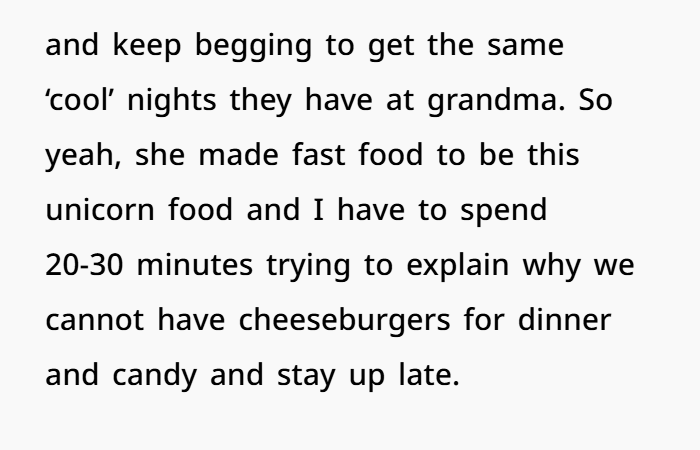
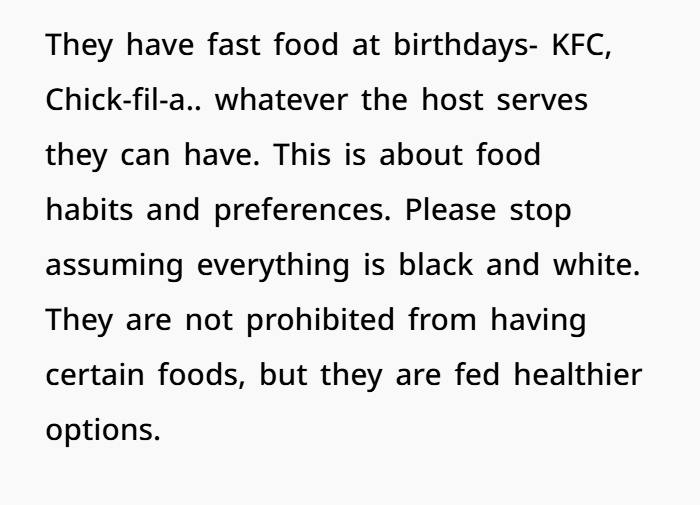


Why Fast Food Shouldn’t Be an Everyday Choice for Kids – Expert Tips for Healthy Eating Habits
Let’s face it — throwing a frozen pizza in the oven or grabbing a Happy Meal from McDonald’s once in a while isn’t going to ruin your child’s health. In fact, occasional fast food can be part of a balanced diet. But the problem begins when these quick, processed meals become a regular part of your child’s diet.
“Nutrition plays a foundational role in a child’s growth, brain development, and motor skills,” says Danielle Zold, Pediatric Registered Dietitian.
“It’s okay to let kids enjoy fast food in moderation, especially if they’re eating healthy most of the time. A good relationship with food includes flexibility—not perfection.”
🚫 Why Highly Processed Foods Can Harm Kids’ Health
The reality is that convenience foods and junk food dominate the diets of many children in the U.S. This includes items high in added sugars, saturated fats, sodium, artificial colors, and preservatives—all of which have very low nutritional value.
Too many parents and caregivers unknowingly allow these foods to replace nutrient-rich options like fruits, vegetables, whole grains, and lean proteins. And this can have serious long-term effects.
“At the children’s hospital where I work, I often see new cases of type 2 diabetes in kids,” shares Maura Fowler, Certified Registered Dietitian Nutritionist.
“When it’s not genetic, it’s usually linked to diet. I understand picky eating can be tough, but parents must stay consistent and seek out food therapy or nutritional guidance if needed.”
🍎 Healthy Eating Tips for Picky Eaters
One of the biggest struggles for parents is dealing with children who are selective eaters. But giving up on offering healthy foods isn’t the answer.
“It can take up to 15 tries before a child accepts a new food,” says Fowler. “But if parents give up too soon, it could increase their child’s risk of obesity, heart disease, or diabetes in the future.”
✅ What Parents Can Do:
- Create a weekly healthy meal plan that includes colorful fruits and vegetables
- Offer whole food snacks like apple slices, nuts (if age-appropriate), or yogurt
- Avoid using junk food as a reward
- Be patient and continue to introduce healthy options
- Talk to a pediatric dietitian if your child struggles with mealtime
Making small changes now can protect your child from serious health problems later. Always remember, your goal isn’t to be perfect — it’s to be intentional and consistent.
Grandparents are famously known to overindulge children
This isn’t meant to scare parents—it’s a reminder that kids’ nutrition is too important to ignore. The foods children eat during their early years can shape their long-term health, including their risk for obesity, diabetes, and heart disease.
“Nutrition matters—but not in the strict, all-or-nothing way many of us were raised,” says Arielle Dani Lebovitz, Pediatric Dietitian.
“What truly impacts a child’s health is the pattern of their eating over time—not one burger or ice cream cone. Fast food isn’t the villain. Balance is key.”
👪 Who’s Feeding Your Kids Matters Too
While parents are mostly responsible for building healthy eating habits at home, they can’t always be there—especially when kids spend time with babysitters, in daycare, or with grandparents.
Grandparents are often loving and generous, but sometimes that means giving kids too many sweets or unhealthy snacks. When this happens once in a while, it’s not a big deal. But if your child spends a lot of time under their care, it can affect their eating habits.
“A treat now and then is fine,” says Maura Fowler, Certified Registered Dietitian Nutritionist.
“But if your child regularly stays with grandparents, it’s a good idea to have an open conversation about your expectations for their meals and snacks.”
🧠 Why Early Food Habits Matter for Brain and Body Health
Regular exposure to highly processed foods—like chips, soda, sugary cereals, and fast food—can cause long-term damage to children’s mental focus, immune system, and metabolism. These foods are often high in refined sugar, unhealthy fats, sodium, and chemical additives, while lacking the nutrients growing bodies need.
Teaching kids to enjoy wholesome meals and nutritious snacks helps build:
- Better eating habits for life
- Stronger immune systems
- Improved focus and learning ability
- Lower risk of chronic illnesses in adulthood
✅ Actionable Tips for Parents and Caregivers:
- Share your child’s nutrition goals with anyone who helps care for them
- Provide easy healthy snack options grandparents can use
- Encourage moderation, not restriction
- Set a good example with your own eating habits
- Create a family nutrition plan that includes extended caregivers
Taking small but consistent steps to improve your child’s diet—at home and beyond—can lead to healthier outcomes and a happier relationship with food.
Experts advise on how to approach the junk food talk with grandparents
Many grandparents love showing affection through food. Whether it’s candy, baked goods, or surprise fast-food trips, their intentions are usually sweet—but the results can sometimes backfire, especially if it’s done secretly or against the parents’ wishes.
“It’s really common for grandparents to show love through food,” says Arielle Dani Lebovitz, Pediatric Dietitian.
“But when it’s done behind the parents’ back, it can break trust and create confusion for the child. That’s why I always encourage parents to lead with connection, not conflict.”
Instead of blaming or criticizing, try opening the conversation with shared values:
🗣 Say something like:
“I know you love the kids and want your time with them to be special. Can we work together on making food choices openly, so the kids don’t feel guilty or need to hide things? If you’re thinking about giving them candy or taking them out for fast food, let’s plan it together.”
This approach makes grandparents feel included—not judged—and allows everyone to support the child’s health in a positive way.
💬 Expert-Approved Tips for Setting Healthy Food Boundaries With Grandparents:
- Focus on teamwork, not control: Present it as shared care for the child, not a power struggle.
- Use inclusive language: Phrases like “Can we…” or “Let’s…” reduce defensiveness.
- Keep the tone positive: The issue isn’t the dessert—it’s the secrecy and mixed messages.
- Provide healthy treat ideas: Suggest alternatives like fruit-based snacks, yogurt pops, or dark chocolate.
- Create simple family rules: For example, “one treat per day”—and let grandparents be the ones to give it.
This way, children learn that food is not something to feel bad about, while still getting the nourishment they need. It also helps build trust, emotional health, and a positive relationship with food from a young age.
The mom provided more information in the comments


